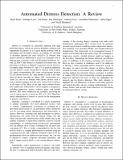Files in this item
Automated screening for distress : a perspective for the future
Item metadata
| dc.contributor.author | Rana, Rajib | |
| dc.contributor.author | Latif, Saddique | |
| dc.contributor.author | Gururajan, Raj | |
| dc.contributor.author | Gray, Anthony | |
| dc.contributor.author | Mackenzie, Geraldine | |
| dc.contributor.author | Humphris, Gerald | |
| dc.contributor.author | Dunn, Jeff | |
| dc.date.accessioned | 2020-03-18T00:33:12Z | |
| dc.date.available | 2020-03-18T00:33:12Z | |
| dc.date.issued | 2019-07-18 | |
| dc.identifier | 257822938 | |
| dc.identifier | 1f7c950e-d185-4eaa-8e5b-290f0de1b929 | |
| dc.identifier | 000476608400048 | |
| dc.identifier | 85069501557 | |
| dc.identifier.citation | Rana , R , Latif , S , Gururajan , R , Gray , A , Mackenzie , G , Humphris , G & Dunn , J 2019 , ' Automated screening for distress : a perspective for the future ' , European Journal of Cancer Care , vol. 28 , no. 4 , e13033 . https://doi.org/10.1111/ecc.13033 | en |
| dc.identifier.issn | 0961-5423 | |
| dc.identifier.other | ORCID: /0000-0002-4601-8834/work/64033873 | |
| dc.identifier.uri | https://hdl.handle.net/10023/19667 | |
| dc.description.abstract | Distress is a complex condition, which affects a significant percentage of cancer patients and may lead to depression, anxiety, sadness, suicide and other forms of psychological morbidity. Compelling evidence supports screening for distress as a means of facilitating early intervention and subsequent improvements in psychological well‐being and overall quality of life. Nevertheless, despite the existence of evidence‐based and easily administered screening tools, for example, the Distress Thermometer, routine screening for distress is yet to achieve widespread implementation. Efforts are intensifying to utilise innovative, cost‐effective methods now available through emerging technologies in the informatics and computational arenas. | |
| dc.format.extent | 160295 | |
| dc.language.iso | eng | |
| dc.relation.ispartof | European Journal of Cancer Care | en |
| dc.subject | Automated distress screen | en |
| dc.subject | Cancer | en |
| dc.subject | Deep learning | en |
| dc.subject | Distress | en |
| dc.subject | Spontaneous speech | en |
| dc.subject | RC0254 Neoplasms. Tumors. Oncology (including Cancer) | en |
| dc.subject | T-NDAS | en |
| dc.subject | SDG 3 - Good Health and Well-being | en |
| dc.subject.lcc | RC0254 | en |
| dc.title | Automated screening for distress : a perspective for the future | en |
| dc.type | Journal article | en |
| dc.contributor.institution | University of St Andrews. Population and Behavioural Science Division | en |
| dc.contributor.institution | University of St Andrews. WHO Collaborating Centre for International Child & Adolescent Health Policy | en |
| dc.contributor.institution | University of St Andrews. Health Psychology | en |
| dc.contributor.institution | University of St Andrews. St Andrews Sustainability Institute | en |
| dc.contributor.institution | University of St Andrews. School of Medicine | en |
| dc.contributor.institution | University of St Andrews. Sir James Mackenzie Institute for Early Diagnosis | en |
| dc.identifier.doi | https://doi.org/10.1111/ecc.13033 | |
| dc.description.status | Peer reviewed | en |
| dc.date.embargoedUntil | 2020-03-18 |
This item appears in the following Collection(s)
Items in the St Andrews Research Repository are protected by copyright, with all rights reserved, unless otherwise indicated.

